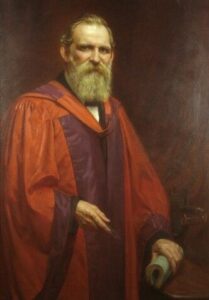Charles Lapworth

Geologist Charles Lapworth (1842-1920) taught English at Madras College, St Andrews. Although predominately self-taught in the field of geology, he made significant contributions to research regarding the Southern Uplands. He is mostly remembered for proposing the Ordovician epoch, a new classification of Lower Paleozoic rocks between the Cambrian and the Silurian periods. This term only gained international approval 40 years after his death. His various awards pay merit to his life and research, including the greatest scientific accolade of the Royal Society – the Gold Medal – in 1899. Furthermore, he is immortalised through the glacial Lake Lapworth in what is now western England, bearing his name in recognition of his suggestion of its existence. He left St Andrews in 1881 to become a professor of geology at the University of Birmingham. Lapworth combined his interests in space and the earth, claiming ‘Astronomy is the oldest of the sciences, while Geology is one of the newest. But the two sciences have this in common: that to both are granted a magnificence of outlook’.
